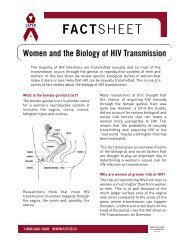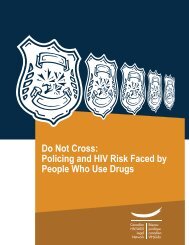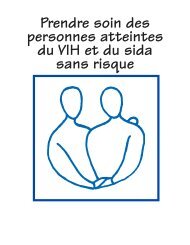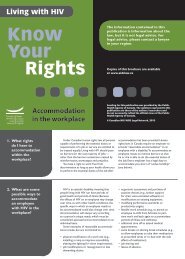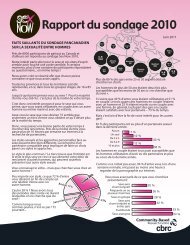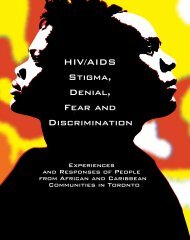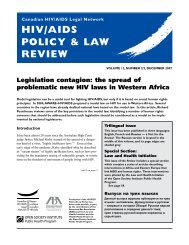BRAZEN: Trans Women's Safer Sex Guide - CATIE
BRAZEN: Trans Women's Safer Sex Guide - CATIE
BRAZEN: Trans Women's Safer Sex Guide - CATIE
You also want an ePaper? Increase the reach of your titles
YUMPU automatically turns print PDFs into web optimized ePapers that Google loves.
<strong>Trans</strong><br />
Women’s<br />
<strong>Safer</strong><br />
<strong>Sex</strong><br />
<strong>Guide</strong><br />
brazen
+inspired us: Thanks!<br />
This guide was originally created by Morgan M. Page, <strong>Trans</strong> Community<br />
Services Coordinator at The 519 Church Street Community Centre. We<br />
would like to thank all those people and projects that inspired us, starting<br />
with the diverse communities of trans folks who visit The 519 and attend 519<br />
programs and events all year long. We would like to give special thanks to<br />
Christina Strang, creator of the original The Happy <strong>Trans</strong>sexual Hooker –<br />
Canada’s first safer sex resource for trans sex workers and trans women.<br />
We’d also like to thank the Gay/Bi/Queer <strong>Trans</strong> Men’s Working Group<br />
and everyone else involved with the creation of PRIMED: The Back<br />
Pocket <strong>Guide</strong> for <strong>Trans</strong>men & The Men Who Dig Them. These two<br />
guides were the primary inspiration for this project, and we owe them<br />
so much! Another source of amazing inspiration was the <strong>Safer</strong> <strong>Sex</strong> for<br />
<strong>Trans</strong>guys: A <strong>Guide</strong> for the Whole Spectrum created by James Cullen.<br />
Special thanks to everyone who looked over the guide, edited it or gave<br />
suggestions, including Logan Broeckaert, Amy Bourns, Melisa Dickie,<br />
Aurora Jade Pichette, Kyle Scanlon, Len Tooley, Kate N., Danielle W.,<br />
Rebecca Hammond, Reece Malone, Christina Strang and James Wilton.<br />
Organizational review: ASTT(e)Q: Action Santé Travesti(e)s et <strong>Trans</strong>sexuel(le)s<br />
du Québec Un projet de Cactus Montréal, Rainbow Resource Centre,<br />
Rainbow Health Ontario, Sherbourne Health Centre and <strong>CATIE</strong>.<br />
Photography by Remi Dietrich.<br />
Thanks to our models Danielle W., Liam S. and Julissa P.<br />
brazen <strong>Trans</strong> Women’s <strong>Safer</strong> <strong>Sex</strong> <strong>Guide</strong><br />
© 2013, The 519 Church Street Community Centre. All rights reserved.<br />
Design: Jonathan Kitchen, jakcreative.com<br />
Copy Edit: Anna Kohn<br />
2 brazen<br />
+contents<br />
describe me: Words, Body Parts, and Identities.............................................4<br />
talk to me: Disclosure and Negotiation..............................................................7<br />
+ T is for Talk: When should I disclose my trans status?<br />
What about my STI status?...........................................................................8<br />
+ Wrap it Up: Negotiating condoms and dams<br />
with sex partners............................................................................................8<br />
fuck me: Tips for <strong>Safer</strong> <strong>Sex</strong>...............................................................................11<br />
+ Fucking ass and vag....................................................................................11<br />
+ Sucking and licking......................................................................................13<br />
+ Rimming........................................................................................................13<br />
+ Scissoring.....................................................................................................13<br />
+ Fisting...........................................................................................................14<br />
+ Fingering and hand jobs..............................................................................14<br />
+ Toys...............................................................................................................15<br />
+ Lube..............................................................................................................15<br />
doctors & me: Talkin’ to your Doc.................................................................17<br />
surgeries & me: Info for trans women who have had genital surgeries......18<br />
+ What can I do? What can’t I do?..................................................................18<br />
+ HIV and other STIs: risks for post-op vag...................................................18<br />
inject me: Needles, Silicone, and STIs............................................................21<br />
pay me: Additional safety tips and tricks for trans sex workers....................... 22<br />
break it down: <strong>Sex</strong>ually <strong>Trans</strong>mitted Infections............................................24<br />
brazen 3
+describe me:<br />
Words, Body Parts, and Identities<br />
Let’s face it: trans folks love words. We’re creating new words and meanings<br />
to describe our identities, our bodies and our lives all the time. And that’s<br />
awesome! But it also makes it hard to be super inclusive of everyone all the time.<br />
In writing this guide, we’re going to try to keep things simple and use the broadest<br />
language possible, but no matter what words we use, we’re going to end up<br />
leaving someone or some word out. We’re really sorry if we’ve used any language<br />
that doesn’t include you or doesn’t feel like the most comfortable for you and your<br />
body. Feel free to cross words out that you don’t like, and write in new ones!<br />
Talking about identities! This guide is for trans women and their sex partners!<br />
When we use the term trans women in this guide, we’re talking about people<br />
who identify on some level as any of the following: woman/womyn/girl/female/<br />
feminine/femme but were assigned male at birth.<br />
Though we’ll be focusing on trans women, this guide will also mention people<br />
who identify on some level as any of the following: man/boy/boi/male/masculine/<br />
butch/stud but were assigned female at birth. We’ll use trans guys to talk about<br />
them.<br />
4 brazen<br />
The word trans is used to include people who might also call themselves any of<br />
these very different words: transsexual/transgender/gender queer/gender fluid/<br />
bigender/queer/cross-dresser/drag queen/drag king. And it can also include some<br />
people who identify as Two-Spirit.<br />
We’ll also be talking about people who aren’t trans – that is, people who were<br />
assigned one gender at birth and more or less still identify with that gender. We’ll<br />
use the words cisgender and cis to describe these people (ie, cis women and cis<br />
men). There are also people whose bodies don’t fit into any of these categories,<br />
or might fit into a few of them, and we’ll be using the word intersex to talk about<br />
them. When talking about people who are living with HIV, we’ll use the word poz.<br />
Talking about body parts! Girl-dick, cock, big clit, clitasaurus-rex, unicorn,<br />
boy bits, strapless, the Kraken. These are just some of the words used by trans<br />
women to talk about the genitals we were born with. For the purposes of this<br />
guide, and for clarity, we’ll be using the word strapless. When talking about the<br />
genitals of trans women who have had sexual reassignment surgery (SRS), we’ll<br />
be using the terms vag, vagina and vulva.<br />
<strong>Trans</strong> guy’s genitals also have a lot of names: dick, cock, t-dick, manhole, cunt,<br />
pussy, front hole. For the purposes of this book, we’ll be using the words t-dick<br />
and front/frontal hole. Some trans guys have phalloplasty or metoidioplasty to<br />
create cocks.<br />
brazen 5
+talk to me:<br />
Disclosure and Negotiation<br />
This part’s going to talk about TALKING! The stuff that usually happens before<br />
and sometimes during sex!<br />
T is for TALK: When should I disclose my trans status?<br />
Figuring out when to tell a potential sex partner that you’re trans can be tough!<br />
Some trans women tell right away, while others might never tell their partners.<br />
For those of us having sex with cis men, there is often a concern about potential<br />
violence. It’s a decision we have to make for ourselves in each situation.<br />
Trust your instincts! If you think potential partners will be cool, tell them. If you<br />
think they might be violent, put on your running shoes and book it! Here are some<br />
things to ask yourself when deciding if it’s the right time to disclose, even if you<br />
think your potential partner will be cool:<br />
• Can you easily leave where you are?<br />
• Are you in a place where you feel comfortable and safe, such as a public<br />
place?<br />
• Does anyone know where you are and who you’re with?<br />
It can be helpful to let someone you trust know that you’re planning to disclose to<br />
someone before you do, so that if anything goes wrong you’ve got someone you<br />
can turn to or who can help find you.<br />
brazen 7
What about my STI status?<br />
Some trans women have HIV or other STIs (sexually transmitted infections), like<br />
syphilis or herpes. So, in addition to disclosing that you’re trans, you might also<br />
have to decide when and how to disclose your STI status.<br />
HIV & the Law<br />
If you have HIV, you’ll also need to consider that not disclosing before having sex<br />
is illegal in Canada.<br />
If you have HIV, you have a legal duty to tell your sex partner(s) before having any<br />
kind of sex that poses a “realistic possibility of transmitting HIV.” People with HIV<br />
have been convicted of serious crimes for not telling their sex partners they have<br />
HIV. Based on the law:<br />
• You do have a legal duty to disclose your HIV status:<br />
o before having vaginal or anal sex without a condom, regardless of your<br />
viral load; or<br />
o before having vaginal or anal sex when your viral load is not<br />
undetectable (or not low), even if you use a condom.<br />
• You do not have a duty to disclose before having vaginal sex if your viral<br />
load is low or undetectable and you use a condom. It is not clear whether this<br />
also applies to anal sex.<br />
• It is not clear how the law applies to oral sex (with or without a condom). It is<br />
also not clear how the law will be applied to trans people.<br />
For more information on HIV and the law, contact the Canadian HIV/AIDS Legal<br />
Network. It may be able to refer you to a lawyer but cannot provide you with legal<br />
advice.<br />
www.aidslaw.ca | info@aidslaw.ca | 416.595.1666<br />
WRAP IT UP: Negotiating condoms and dams with sex partners<br />
Negotiating safer sex is all part of making sure everyone involved is consenting.<br />
Consent is knowing everyone wants to do what they’re doing and not just<br />
because they are afraid to say no or because they are drunk or high. Check in<br />
with yourself and ask your partner. If they say no or say nothing or don’t seem into<br />
it, stop and talk about it. <strong>Sex</strong> without consent is sexual assault.<br />
For some people, negotiating safer sex can be about more than just HIV and<br />
STI prevention. It can also be about self-esteem, personal boundaries and<br />
pleasure. Some of us might not see ourselves or our bodies as worthwhile, so<br />
using condoms might not be a priority for us. Even if you don’t value your health,<br />
remember that you’re putting all of your partners at risk, too.<br />
It’s important to know what your limits are. For some people, having strict<br />
boundaries can help them overcome past bad experiences around sex and<br />
intimacy. If your partner insists on using condoms, gloves or dental dams for<br />
particular sex acts, make sure to respect their boundaries, just as you’d want<br />
yours to be respected.<br />
This resource mentions different types of protective barriers.<br />
Penetrative Condoms: Sometimes referred to as male condoms. Used on<br />
strapless for vaginal or anal sex. Can be cut to be used as dental dams.<br />
Insertive Condoms: Sometimes referred to as female condoms. Can be used<br />
by women in their vaginas, trans guys in their front holes and everyone in their<br />
asses. Can be cut in half to be used as dental dams.<br />
Dental Dams: Mostly used to protect both partners during oral sex.<br />
Latex Gloves: Can be cut up to be used during mutual masturbation by trans<br />
guys on their t-dicks and as dental dams for people having oral sex. Some trans<br />
guys who haven’t had phalloplasty find that dental dams don’t work well after<br />
they’ve been on T for a long time (or if they have had a metoidioplasty), so one<br />
solution is to cut a glove on the thumb-side from the wrist to where the thumb<br />
starts. This can cover their t-dick, while the rest can hang down and be used as a<br />
dental dam.<br />
Non-microwaveable Plastic Wrap: Non-microwaveable plastic wrap is not as<br />
effective at preventing transmission of STIs as dental dams and condoms are,<br />
so it should only be used when condoms or dams aren’t available. If you’re using<br />
non-microwaveable plastic wrap because condoms don’t stay on during sex,<br />
it probably means you’re using the wrong size condom, so try using a smaller<br />
or bigger one. Make sure to use lots of lube too. Friction can make condoms<br />
fall off during sex. If you do use plastic wrap during sex, make sure it’s<br />
non-microwaveable since the microwaveable kind is porous (has holes) and won’t<br />
be effective. Can be used during oral sex.<br />
If you want to protect yourself and your sex partners against HIV and other STIs,<br />
you’ll both need to use condoms, dental dams and/or gloves where appropriate.<br />
But sometimes getting a partner to use them can be tricky. Our two big tips are:<br />
BE CLEAR and BE FIRM.<br />
BE CLEAR when you explain that you want to use condoms, dental dams or<br />
gloves. It’s about your health and theirs.<br />
BE FIRM about it! Stop sex if you have to. Some sex partners might try to tell you<br />
that they don’t want to use condoms, dental dams or gloves for any number of<br />
reasons, including:<br />
8 brazen<br />
brazen 9
“They don’t fit! It feels too tight for my size!” Condoms come in larger sizes,<br />
however regular condoms can be stretched to fit over an adult’s head, so this<br />
reason is total BS! You can also try using insertive condoms, which might feel<br />
better for you and your partner.<br />
“I’m allergic to latex!” That’s okay because you can always use polypropylene<br />
brands (such as Skyn or Bare) or polyurethane condoms/dental dams/gloves. So<br />
make sure to have some on hand!<br />
“I can’t feel anything when I use those!” Sometimes people don’t feel as much<br />
with latex condoms and dental dams. Polyurethane condoms and dental dams<br />
are thinner and give more sensation! Give them a try!<br />
“But I’m clean/safe/disease-free!” Often people don’t experience symptoms of<br />
HIV and other sexually transmitted infections (STI) right away or at all. Also, many<br />
people haven’t ever been tested for HIV or other STIs. And even if they show you<br />
a transcript of their latest HIV test or STI screening, if they’ve had sex since then<br />
(or even up to three months before an HIV test), you could still be at risk! (For<br />
more information, please see break it down: <strong>Sex</strong>ually <strong>Trans</strong>mitted Infections, page<br />
24.)<br />
“But if you loved me, you wouldn’t ask me to do that!” The truth is, if someone<br />
loves you, they would want to protect your health. So, if they really love you, they<br />
will use a condom, dental dam or glove. Plus, lots of folks enjoy using barriers<br />
like condoms and dental dams, because they find it hot or they feel more relaxed<br />
because they don’t have to worry about risk, so your partner should hopefully<br />
respect that!<br />
No matter what their reason is, your health is worth more than sex or money! If a<br />
sex partner refuses to use condoms, try suggesting a hand job instead of a blow<br />
job or anal/vaginal/frontal sex. If they still refuse, end the session, and if they are<br />
a client give them back some or all of their money, make up an excuse for leaving<br />
and get out of there!<br />
10 brazen<br />
+fuck me:<br />
Tips for <strong>Safer</strong> <strong>Sex</strong><br />
THE BASICS<br />
Here’s what it comes down to: body fluids can transmit HIV and other STIs.<br />
This means cum/semen (including pre-cum), blood, vaginal fluids, rectal fluids<br />
(bum juice) and breast milk. People can have STIs and not know it, and pass<br />
them to others. Most STIs don’t have signs or symptoms. Getting an STI can<br />
suck, but most are treatable and some can be cured, especially if caught early<br />
on! That’s why it’s really important to see a doctor or go to a sexual health clinic if<br />
you think you may have been exposed.<br />
FUCKING ASS and VAG<br />
The old in-out, in-out! Getting fucked in the ass or vag with a cock, a strap-on or<br />
a toy, and fucking people in the ass or vag with your strapless, a strap-on or a toy<br />
can be powerful. Just remember that especially with cocks and strapless, this can<br />
be one of the highest risk sex acts if you’re not using a barrier like a condom! It’s<br />
pretty much high risk for HIV and every other STI. Get fucked hard and safely by<br />
following these easy tips:<br />
• Wrap it up! Use a condom. This means on your strapless and strap-on too!<br />
• Change condoms between holes and between partners! This helps prevent<br />
the spread of bacteria and STIs between different body parts and partners.<br />
• Use lube! Water-based lubes are best, especially if you’re using latex<br />
condoms. This helps prevent tears in the anal and vaginal lining, and helps<br />
keep the condom from breaking, which will help prevent you and your partner<br />
from getting HIV or other STIs.<br />
• Barebacking (not using condoms) is popular in porn, but beware! This is a<br />
high risk way to have sex. Respect your body and your partner’s body by<br />
using condoms and lube.<br />
• Use condoms when you’re fucking a cis woman or a trans man with your<br />
strapless if you don’t want to get them pregnant and they aren’t using birth<br />
control. Dipping, or fucking for a while before putting on a condom, is just<br />
as high risk! Nobody has to cum for HIV and other STIs to be transmitted,<br />
because precum and vaginal fluids can pass STIs too.<br />
brazen 11
SUCKING and LICKING<br />
Wet, wet, wet! Sucking, licking, eating out – it’s all the same thing. Oral sex (using<br />
your mouth and tongue on someone’s crotch) is really hot! Oral sex is low risk for<br />
HIV transmission, but you could still be at risk for other STIs including: herpes,<br />
gonorrhea, and syphilis. Don’t worry, though, you can suck and lick safely to your<br />
heart’s delight with these simple tips:<br />
• Use a condom for t-dicks and strapless. Put some lube on the inside of the<br />
condom for extra sensation! <strong>Trans</strong> men who have had phalloplasty should<br />
also use condoms.<br />
• Use a dental dam or gloves for vag and t-dicks.<br />
• If you’re not using a condom:<br />
o<br />
If you have a sore throat or any cuts or sores in your mouth, you may be<br />
more likely to get an STI by giving oral sex.<br />
o Don’t floss or brush your teeth or rinse with mouthwash for at least 30<br />
minutes before sucking or licking. Oral care can cause tiny cuts inside<br />
your mouth which increase your risk of spreading STIs.<br />
o<br />
Make sure to try to avoid swallowing cum and precum, if you decide to<br />
go without a condom.<br />
RIMMING<br />
Eating ass can be super-hot. And while it’s a low risk for spreading HIV,<br />
rimming is high risk for transmitting parasites (worms) or some STIs such as<br />
chlamydia, gonorrhea, syphilis, HPV and hepatitis (A and B). Using a dental dam,<br />
non-microwaveable plastic wrap or a condom cut up the middle can really help<br />
reduce risks!<br />
SCISSORING<br />
When two people with vulvas rub their genitals together, we usually call this<br />
scissoring or tribbing. <strong>Trans</strong> women who are partnered with cis women and trans<br />
men who have not had phalloplasty often enjoy this, especially if the trans woman<br />
has had sexual reassignment surgery. This is low risk for spreading HIV, but can<br />
be a risk for spreading syphilis, gonorrhea, HPV and herpes! There are a couple<br />
of different ways to reduce your risk, though:<br />
• Try wearing underwear and/or pants while tribbing to reduce contact with<br />
fluids.<br />
• Using non-microwaveable plastic wrap with lube is probably the safest way to<br />
trib!<br />
brazen 13
FISTING<br />
Now you see it, now you don’t! Fisting is like a magic trick. This is what we call it<br />
when you insert your entire hand (or just most of it) into your partner’s ass or vag/<br />
frontal hole. <strong>Trans</strong> women who have had sexual reassignment surgery should<br />
check out our section on genital surgeries (page 18) before being fisted. For the<br />
person receiving, fisting can increase the risk for spreading or getting HIV or STIs<br />
during other sex acts for up to two weeks after being fisted.<br />
If you’re the person doing the fisting, there is a very low risk for HIV transmission,<br />
as long as you don’t have cuts or sores on your hand. Remember that sometimes<br />
cuts (like hangnails) can be hard to notice. There are a couple of different ways to<br />
reduce your risk while fisting:<br />
• Use gloves!<br />
• Use lube! This will decrease the tears and rips in the anal or vaginal/frontal<br />
lining that make it easier to catch or spread HIV and other STIs. Water-based<br />
lubes are better, especially if you are using a latex glove.<br />
• Condoms are the best way to reduce the risk of STI transmission. Fisting<br />
can increase the chance of passing HIV and other STIs because it can be<br />
damaging to the walls of the ass and vag.<br />
• Clip your nails! Long nails are more likely to cut the person being fisted.<br />
FINGERING and HANDJOBS<br />
Stick a finger in it, or put your hand around it! No matter the shapes of genitals<br />
involved, this is usually low risk for transmitting HIV, but you could still be at risk<br />
for getting or spreading warts or even herpes! To reduce your risk even further:<br />
• Wash your hands before sex! Soap and water, nice and easy.<br />
• Check carefully to make sure you don’t have any open cuts or abrasions! It<br />
can be really hard sometimes to see or feel very small cuts and abrasions.<br />
• Wear gloves! Especially if you’re penetrating a vag, frontal hole or ass. Make<br />
sure to switch gloves between each hole and each partner so that you don’t<br />
pass any bacteria or viruses between genitals and partners.<br />
• Don’t use another person’s cum/juices as lube to finger or give yourself a<br />
hand job.<br />
TOYS<br />
Dildos, vibrators and even cucumbers can be fun and sexy in the bedroom! They<br />
are also pretty much no risk for spreading HIV or other STIs as long as you follow<br />
these simple suggestions:<br />
• Put a condom or non-microwaveable plastic wrap over it!<br />
• Change the condom or non-microwaveable plastic wrap between holes and<br />
between partners! This will prevent spreading bacteria and STIs between<br />
body parts and partners!<br />
• Clean the toy after using it! After use, silicone dildos should be boiled for up<br />
to five minutes or washed with antibacterial soap. Rubber and cyber-skin<br />
cocks are porous, so you can’t fully sterilize them – so make sure to always<br />
use a condom with them!<br />
• Vegetables can be toys, too! Cucumbers, or even a butternut squash if<br />
you’re really ambitious, can work great as toys. Just make sure to wash<br />
them thoroughly with soap and water before inserting them, and check to<br />
make sure that they’re still good. If they look a bit expired, beware! Expired<br />
vegetables can cause yeast infections – ew!<br />
LUBE<br />
For anal and vaginal sex and fisting, lube can be an essential part of having a<br />
good time. Using lubricants can reduce tearing of the anal or vaginal lining. Small<br />
tears increase your risk of contracting or spreading HIV and other STIs.<br />
Recommended<br />
Water-based lubes (such as Astroglide).<br />
Silicon-based lubes: they’re safe with latex and polypropylene/polyurethane<br />
condoms, and tend to last longer than water-based lubes. You shouldn’t use<br />
silicone-based lubes with silicone toys as they will degrade the toys. And be<br />
careful – they can stain fabrics like sheets or clothes!<br />
Not Recommended<br />
Vaseline, water, spit, massage oils, lotions, cooking oils (like Crisco) and other<br />
oils are NOT recommended! Vaseline is made from petroleum and will degrade<br />
the anal or vaginal lining, increasing your risk of getting an STI. Water, spit and<br />
oils tend to be absorbed quickly by the body, meaning you’ll get dry fast, which<br />
also increases your risk.<br />
And remember: Even if you’re using a spermicidal lubricant, you still need to use<br />
a condom or glove to prevent the spread of HIV and other STIs! Plus spermicidal<br />
lubricant can degrade your lining, too, and that can increase your risk.<br />
14 brazen<br />
brazen 15
+doctors & me:<br />
Talkin’ to your Doc<br />
Talking to your doctor can be really hard as a trans person, and/or as someone<br />
having sex with a trans person. This is especially true if you aren’t sure if your<br />
doctor is both trans-friendly and sex-friendly. But if you want to have incredibly<br />
hot, healthy sex, at some point you’ll need to talk to your doctor. Here are some<br />
things to bring up with your doctor or at a sexual health clinic:<br />
• If you are having any kind of sex (including blow jobs), you should get tested<br />
regularly for HIV and other STIs. Some people get tested every few months,<br />
while others feel they only need to get tested once a year. Remember that<br />
even if you’re in a long-term monogamous relationship, you should still get<br />
tested for HIV and STIs at least once a year!<br />
• If you’re poz, you should still keep getting tested for other STIs! Remember,<br />
you can still get and spread other STIs, and getting them could really hurt<br />
your immune system. They may also be a bit trickier to treat if you’re poz. Let<br />
your doctor know if you have other STIs so they can help keep you healthy.<br />
• Talk to your doctor about any discharges, itchiness or unusual odours you<br />
find coming from your genitals, throat or ass.<br />
• <strong>Trans</strong> people should talk to their doctors about vaccinations. You may qualify<br />
for free vaccinations against hepatitis (A and B).<br />
brazen 17
+surgeries & me:<br />
Info for <strong>Trans</strong> Women<br />
Who’ve had Genital Surgeries<br />
Many trans women love the genitals they were born with and don’t feel they need<br />
to alter them, while others can’t afford to have the surgeries they’ve decided<br />
would be best for their bodies. Still, some trans women both want and are able<br />
to have genital surgeries, such as orchidectomy (removing the balls) or sexual<br />
reassignment surgery (SRS)/vaginoplasty. If you are a woman who has had or<br />
wants to have one of these surgeries or if you are sleeping with one of these<br />
women, this section is for you!<br />
WHAT CAN I DO? WHAT CAN’T I DO?<br />
Orchidectomy – An orchidectomy (orchi) removes the balls, which produce most<br />
of the testosterone in the body. They also create semen. So, if you’ve had an<br />
orchi, you might find that this changes sex a bit. First off, you might still pre-cum,<br />
but might not be able to cum anymore. Just because you can’t cum doesn’t mean<br />
that you can’t have an orgasm, though! And it also doesn’t mean that you’re no<br />
longer at risk for STIs! You might find that you’re unable to maintain an erection<br />
after having an orchi. If you can, use a condom when having sex with your<br />
strapless. If you find that you can’t get a condom to stay on, it’s usually because<br />
it’s not the right size or you haven’t lubed up enough. Try a different sized condom<br />
or lube up more to see if this keeps the condom on. If it doesn’t, as a last resort,<br />
use non-microwaveable plastic wrap.<br />
HIV and other STIs: risks for post-op vag<br />
<strong>Sex</strong>ual Reassignment Surgery/Vaginoplasty – So you have a vagina! Your<br />
new vag and vulva were probably created with skin from your penis, testicles,<br />
thighs and maybe even your colon! There are a few things to keep in mind:<br />
18 brazen<br />
• You’re still at risk for getting or spreading HIV and other STIs! Depending on<br />
the kind of surgery, you might even be at a higher risk than you were before<br />
(such as when a surgeon uses parts of your colon). So make sure that your<br />
partners use condoms, dental dams and/or gloves.<br />
• <strong>Trans</strong> vag doesn’t usually self-lubricate. While some trans women selflubricate<br />
a bit, most don’t get any self-lubrication and those of us who do<br />
don’t lubricate as well as cis women or trans men. So make sure to use lube,<br />
which will reduce tears and rips in your vaginal lining and make sex a whole<br />
lot easier!<br />
• <strong>Trans</strong> women’s vaginas are less stretchy and more delicate than cis women’s<br />
vaginas and trans men’s frontal holes, so there are some things that you<br />
might not ever be able to do sexually. The number one among them is<br />
vaginal fisting. You might also be advised against anal sex and anal fisting<br />
for a number of years (usually two years) post-operatively, or for life. Check<br />
with your surgeon. One of the reasons for this is that it could cause a vaginal<br />
prolapse – that means that your vagina could fall out. You could also cause a<br />
fistula – a hole between the anal and vaginal linings, which can be very hard<br />
to repair and dangerous to your health! So be careful! When you are having<br />
anal sex, take it slow and easy at first, and stop if you feel irregular pain.<br />
• Don’t forget to dilate! Dilation is the insertion of a plastic stent (fancy medical<br />
term for dildo) into the vagina on a regular basis to keep the vagina open<br />
and flexible. Not dilating regularly can lead to loss of both depth and width,<br />
which means your vagina might become too small for penetration (sex). The<br />
reduction in size that may accompany a lack of dilation may be completely<br />
irreversible, so follow your surgeon’s guidelines for dilation schedule. If you<br />
experience any complications after surgery, most are fixable as long as you<br />
continue to dilate. So keep dilating!<br />
• If you experience pain or tightness while getting fucked, try dilating an hour<br />
or two before you have sex. It can be hard to predict this sort of thing, but<br />
dilating before sex can really help make sex easier and more pleasurable!<br />
• If you’re being penetrated, try different positions to find ones that work best<br />
for your body. Some positions work better than others for trans vag, but it<br />
varies between women.<br />
• Your vagina can also get yeast infections, so be careful that anything going<br />
into your vag is clean!<br />
• The jury is still out about whether or not your new vag will need Pap smears.<br />
Some doctors say yes, and some say no. Some kinds of HPV can lead to<br />
cervical or anal cancers, and your new vag may be able to contract these!<br />
Better to be safe than sorry! Ask your doctor about getting a Pap smear<br />
done.<br />
brazen 19
+inject me:<br />
Needles, Silicone, and STIs<br />
Needles can be an essential part of our lives as trans women, especially if<br />
we’re using them to inject hormones or if we decide to have silicone injections<br />
to change our bodies. They can also be part of our lives if we use drugs such as<br />
crystal meth or heroin.<br />
Injections don’t have to be a danger to your health. There are ways to help you<br />
significantly reduce the risk of developing abscesses and infections or getting HIV<br />
and hepatitis C when you inject.<br />
Here are some things to keep in mind:<br />
• Make sure to keep your injection sites (wherever you’re putting needles into<br />
your body) clean by washing your hands with soap, swabbing the injection<br />
site with alcohol before injecting, and using band-aids after.<br />
• Always use a new, clean needle every time you inject. You can get free new<br />
needles and injecting supplies from needle distribution programs through<br />
your local community health centre.<br />
• Hormones are usually injected with a different gauge (size) of needle<br />
and with a bigger syringe than drugs. Hormones are usually injected with<br />
muscular gauge needles (needles for injecting into muscle), so make sure to<br />
have some on hand! You can purchase these at any pharmacy or pick them<br />
up from your doctor’s office or community health centre.<br />
• Don’t just throw needles out! You can pick up a biohazard needle collection<br />
bin in many different places like a pharmacy or your doctor’s office. If you<br />
don’t have a hazardous waste bin nearby, put used needles in a plastic water<br />
bottle. You can return these at a pharmacy, your doctor’s office or a needle<br />
distribution program. Many community centres have hazardous waste bins in<br />
their bathrooms, too.<br />
brazen 21
+pay me:<br />
Additional Safety Tips and Tricks<br />
for <strong>Trans</strong> <strong>Sex</strong> Workers<br />
<strong>Sex</strong> work can be a viable (and sometimes fun) way to support yourself and pay<br />
for hormones and surgeries. Some of us do sex work just to make money, while<br />
others find it can also be a self-esteem boost, validating our identities and bodies<br />
as desirable.<br />
Like some other types of work, sex work can occasionally be risky. It’s important<br />
to have a plan to protect yourself if ever these situations arise.<br />
Before a Date<br />
• Check out the Bad Date Book from your local sex workers’ organization. This<br />
contains information on bad clients who have been violent with other sex<br />
workers.<br />
• Find a trustworthy friend to call before and after dates. Let them know the<br />
client’s name, phone number, email and/or license plate number (or pretend<br />
to do this in front of the client), in case the date goes bad. This lets the client<br />
think that there will be someone out there who knows where you’re supposed<br />
to be and who will alert the police if you go missing.<br />
• Working in pairs or in groups can help if you’re working on the street. Write<br />
down the license plate numbers of the clients your friends go with, and have<br />
your friends do the same for you.<br />
• Always carry condoms and lube! Don’t rely on the client to bring these.<br />
You can get free condoms from most community centres and sexual health<br />
clinics.<br />
22 brazen<br />
• Wearing lip gloss or lip balm can help prevent you from getting cuts or tears<br />
on your lips, especially during the winter. Cuts and tears on your lips will<br />
increase your risk of getting HIV and other STIs.<br />
• Avoid wearing necklaces or scarves! These can be used to choke you if the<br />
date goes bad.<br />
On a Date<br />
• Never believe the client! Always assume that clients might be lying to you.<br />
• If you can, carry only your health card for ID so that if you get robbed you<br />
won’t lose your other ID, but if you need to go to the hospital you’ll be able to<br />
get care.<br />
• Be clear and firm about your prices and your limits! If you prefer to use<br />
condoms for blow jobs, be firm about it, even if they offer you extra money or<br />
say they won’t have sex with a condom on. Better to lose the money and find<br />
another client than to risk your health!<br />
• Get money first, get down second! No pay, no play. Make sure that your<br />
clients pay you upfront.<br />
• Dates with more than one client at a time can be risky! If you feel<br />
uncomfortable, get out of there right away.<br />
• If you feel threatened or uncomfortable, get out of there as fast as you can!<br />
Call 911 if you feel safe doing so, or report the incident to your local sex<br />
workers’ organization or trans organization.<br />
After a Date<br />
• If something goes wrong on a date that makes you feel unsafe, consider<br />
reporting it to your local sex workers’ organization or to the police.<br />
brazen 23
+break it down:<br />
<strong>Sex</strong>ually <strong>Trans</strong>mitted Infections<br />
Getting an STI isn’t the end of the world. But, left untreated, it can damage your<br />
health and your partners’ health. This chart gives some basic information on<br />
a few different STIs, how they are transmitted, how to reduce your chances of<br />
getting and giving them, and how they can be treated.<br />
HIV (Human Immunodeficiency Virus)<br />
How you get it:<br />
+ Unprotected anal or vaginal/frontal sex (without a condom).<br />
+ Sharing needles or other equipment to inject drugs (including hormones).<br />
+ HIV can be passed:<br />
- by sharing needles or ink to get a tattoo<br />
- by sharing needles or jewellery to get a body piercing<br />
- to a fetus or baby during pregnancy, birth or breast-feeding. But vertical<br />
transmission (from parent to child) with effective prevention now occurs less<br />
than two percent of the time in Canada.<br />
How they treat it:<br />
+ Talk to your doctor.<br />
+ There is no cure for HIV, but there is treatment. With proper care and<br />
treatment, most people with HIV can avoid getting AIDS and can stay healthy<br />
for a long time.<br />
How to reduce your chance of getting and giving it:<br />
+ Use a condom for fucking.<br />
+ Make sure to use new needles and not to share needles.<br />
+ Avoid contact with blood and semen.<br />
24 brazen<br />
Syphilis<br />
How you get it:<br />
+ Unprotected oral, anal or vaginal/frontal sex.<br />
+ Wet kissing (much less commonly).<br />
+ Contact with a syphilis sore.<br />
+ It can be passed from parent to child during birth.<br />
What it can feel like:<br />
+ Many people do not initially have symptoms.<br />
+ Some people get a painless open sore on or inside their body (genitals, anus or<br />
mouth being the most common places).<br />
+ Some people experience hair loss, rashes (especially on the hands and feet),<br />
fever, swollen glands and muscle and joint pain. If left untreated syphilis can<br />
cause serious damage to major organs.<br />
How they treat it:<br />
+ Talk to your doctor.<br />
+ Syphilis is usually curable with antibiotics.<br />
How to reduce your chance of getting and giving it:<br />
+ Use condoms for anal, oral and vaginal/frontal sex with t-dicks, strapless and<br />
strap-ons.<br />
+ Use dental dams for oral sex with vag or frontal parts.<br />
Genital Herpes<br />
How you get it:<br />
+ Skin-to-skin contact with the infected area, even if there are no symptoms.<br />
+ Unprotected oral, anal or vaginal/frontal sex.<br />
+ Kissing.<br />
What it can feel like:<br />
+ Many people do not have symptoms, but if they do, the symptoms may occur<br />
one week after transmission.<br />
brazen 25
+ Itching or tingling in the ano-genital area or mouth.<br />
+ Tender, swollen glands.<br />
+ One or more blisters that may turn into painful sores.<br />
+ Headaches, fever, muscle pain.<br />
How they treat it:<br />
+ Talk to your doctor.<br />
+ There is no cure for genital herpes, however there are antiviral drugs that can<br />
help reduce or prevent symptoms.<br />
+ Keep the area clean and dry; avoid tight synthetic underwear and pants.<br />
+ Bathe quickly and use a hairdryer, instead of a towel, to dry around the sores.<br />
How to reduce your chance of getting and giving it:<br />
+ Use condoms for anal, oral and vaginal/frontal sex with t-dicks, strapless and<br />
strap-ons.<br />
+ Use dental dams for oral sex with vag or frontal holes.<br />
+ Try to avoid having sex during an outbreak.<br />
Gonorrhea<br />
How you get it:<br />
+ Unprotected oral, vaginal/frontal or anal sex.<br />
+ It can be passed from parent to child during childbirth.<br />
What it can feel like:<br />
+ Some people do not have symptoms, but those who do may notice them two to<br />
five days after transmission.<br />
+ Yellow discharge from t-dick, strapless, vagina, front hole or anus.<br />
+ Sore throat.<br />
+ Pain during penetration.<br />
+ Blood in your shit.<br />
+ Burning or painful sensation when you pee.<br />
+ Pain in your lower abdomen, fever and chills.<br />
How they treat it:<br />
+ Talk to your doctor.<br />
+ Gonorrhea is treatable with antibiotics.<br />
+ Untreated, gonorrhea can lead to pelvic inflammatory disease, which can cause<br />
infertility.<br />
How to reduce your chance of getting and giving it:<br />
+ Use a condom for oral, vaginal/frontal and anal sex.<br />
+ Use a dental dam for sex with a vagina or front hole.<br />
+ If you have gonorrhea, talk to your doctor to get antibiotics. Take them exactly<br />
as directed.<br />
Human Papillomavirus (HPV, Genital Warts)<br />
How you get it:<br />
+ Skin-to-skin contact with the infected area.<br />
+ Unprotected oral, anal or vaginal/frontal sex.<br />
26 brazen<br />
What it can feel like:<br />
+ Many people do not have symptoms.<br />
+ Single wart or clusters of warts on, in and around the genitals and/or anus.<br />
+ Warts may be round, flat or a cauliflower shape that are flesh-coloured or grey.<br />
How they treat it:<br />
+ Talk to your doctor.<br />
+ HPV has no cure, but once warts are present, you can choose to freeze them,<br />
burn them or use topical creams to get rid of them.<br />
+ Without treatment, some strains of HPV can lead to anal or cervical cancers.<br />
While most trans women don’t have cervixes, they may still need Pap smears.<br />
This is especially true if they have had an HPV infection in the tissues that<br />
make up their new vagina. These Pap smears screen for changes in the vagina<br />
rather than other Pap smears which screen the cervix. Talk to your doctor about<br />
whether you’re a trans woman who needs a Pap smear.<br />
How to reduce your chance of getting and giving it:<br />
+ Use condoms, dental dams and/or gloves for oral, vaginal/frontal and anal sex,<br />
and for hand jobs.<br />
+ Warts from the hands can be transferred to the genitals.<br />
+ Get regular Pap smears to screen for cervical abnormalities.<br />
+ Talk to your doctor about getting a vaccine to protect you from warts and some<br />
strains of HPV.<br />
Chlamydia<br />
How you get it:<br />
+ Unprotected oral, anal or vaginal/frontal sex.<br />
+ It can be passed from parent to child during birth.<br />
What it can feel like:<br />
+ Some people do not have symptoms, but for those that do, symptoms may<br />
appear 1-3 weeks after transmission.<br />
+ Abnormally watery or thick discharge from the penis, strapless, or vagina, front<br />
hole.<br />
+ Pain during sex or while peeing.<br />
+ Pain in abdomen.<br />
+ Fever.<br />
How they treat it:<br />
+ Talk to your doctor.<br />
+ Chlamydia is treatable with antibiotics.<br />
+ Untreated chlamydia can lead to pelvic inflammatory disease, which can cause<br />
infertility.<br />
How to reduce your chance of getting and giving it:<br />
+ Use a condom for oral, vaginal/frontal, and anal sex.<br />
+ Use a dental dam for oral sex with vagina or front hole.<br />
+ If you have chlamydia, talk to your doctor to get antibiotics.<br />
brazen 27
+need more info?<br />
The 519 Church Street<br />
Community Centre<br />
Toronto, Ontario<br />
www.the519.org<br />
2-Spirited People of the 1st Nations<br />
Toronto, Ontario<br />
www.2spirits.com<br />
416.944.9300<br />
Action Santé Travesties<br />
et <strong>Trans</strong>sexuelles du Québec<br />
(ASTT(e)Q<br />
Montreal, Quebec<br />
www.astteq.org<br />
514.847.0067 x207<br />
Alberta <strong>Trans</strong> Org<br />
Calgary, Alberta<br />
www.albertatrans.org<br />
Catherine White Holman<br />
Wellness Centre<br />
Vancouver, British Columbia<br />
www.cwhwc.com/<br />
Head and Hands<br />
Montreal, Quebec<br />
www.headandhands.ca/programs-services/<br />
health/hormone-treatment/<br />
Rainbow Resource Centre<br />
Winnipeg, Manitoba<br />
www.rainbowresourcecentre.org<br />
204.474.0212<br />
<strong>Trans</strong> Health Clinic,<br />
Klinic Community Health Centre<br />
Winnipeg, Manitoba<br />
www.klinic.mb.ca<br />
204.784.4090<br />
<strong>Trans</strong>gender Health Program,<br />
Vancouver Coastal Health<br />
Vancouver, British Columbia<br />
www.transhealth.vch.ca<br />
866.999.1514<br />
<strong>Trans</strong> Sask Support Services<br />
Regina, Saskatchewan<br />
www.transsask.org<br />
Need more information and resources on HIV or hepatitis C?<br />
Contact <strong>CATIE</strong>: 1.800.263.1638 | www.catie.ca | info@catie.ca<br />
<strong>CATIE</strong> Ordering Centre No: ATI-26424 (aussi disponible en français, ATI-26425)<br />
Nationalized and printed with assistance from <strong>CATIE</strong>, 2013.



